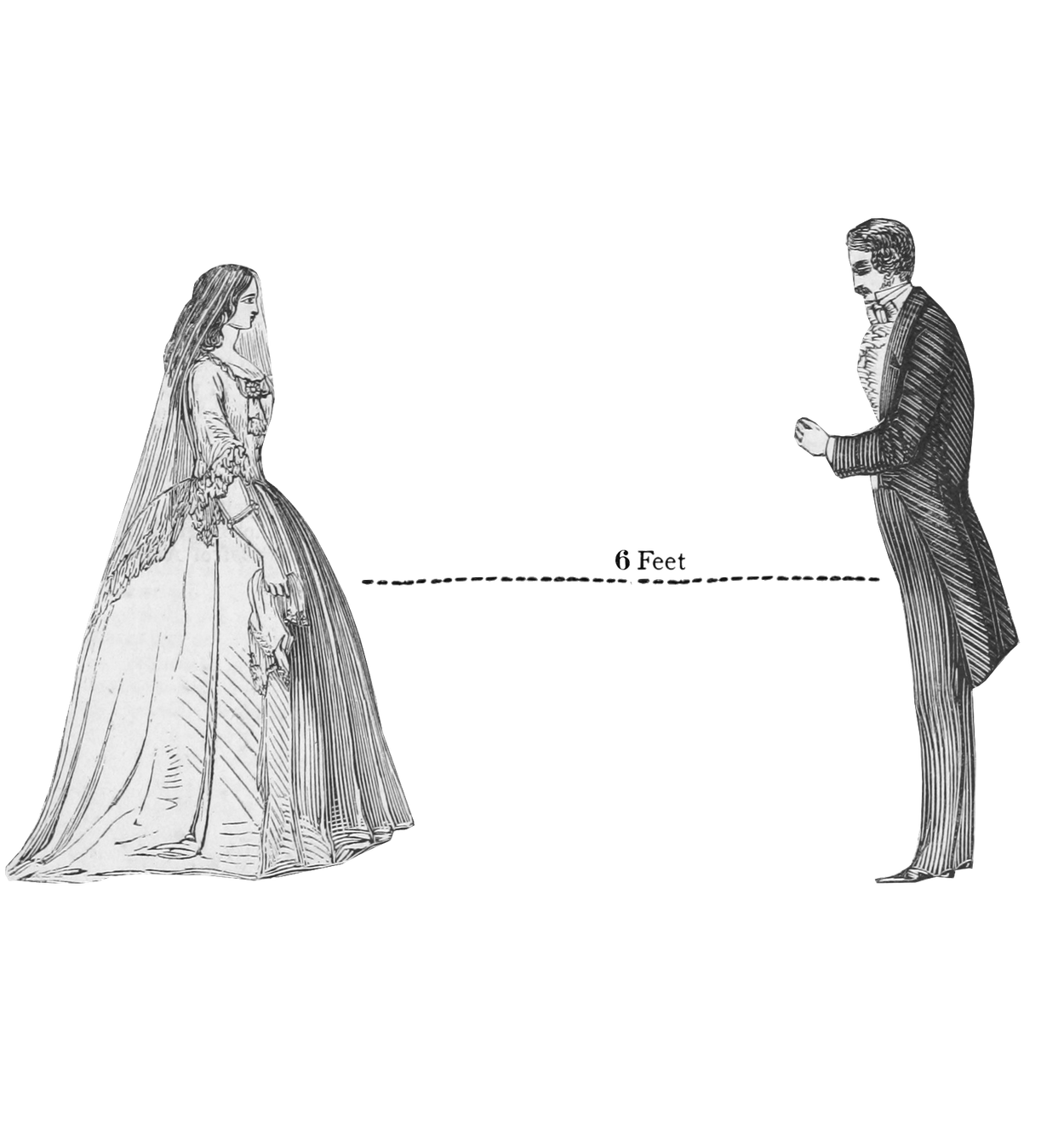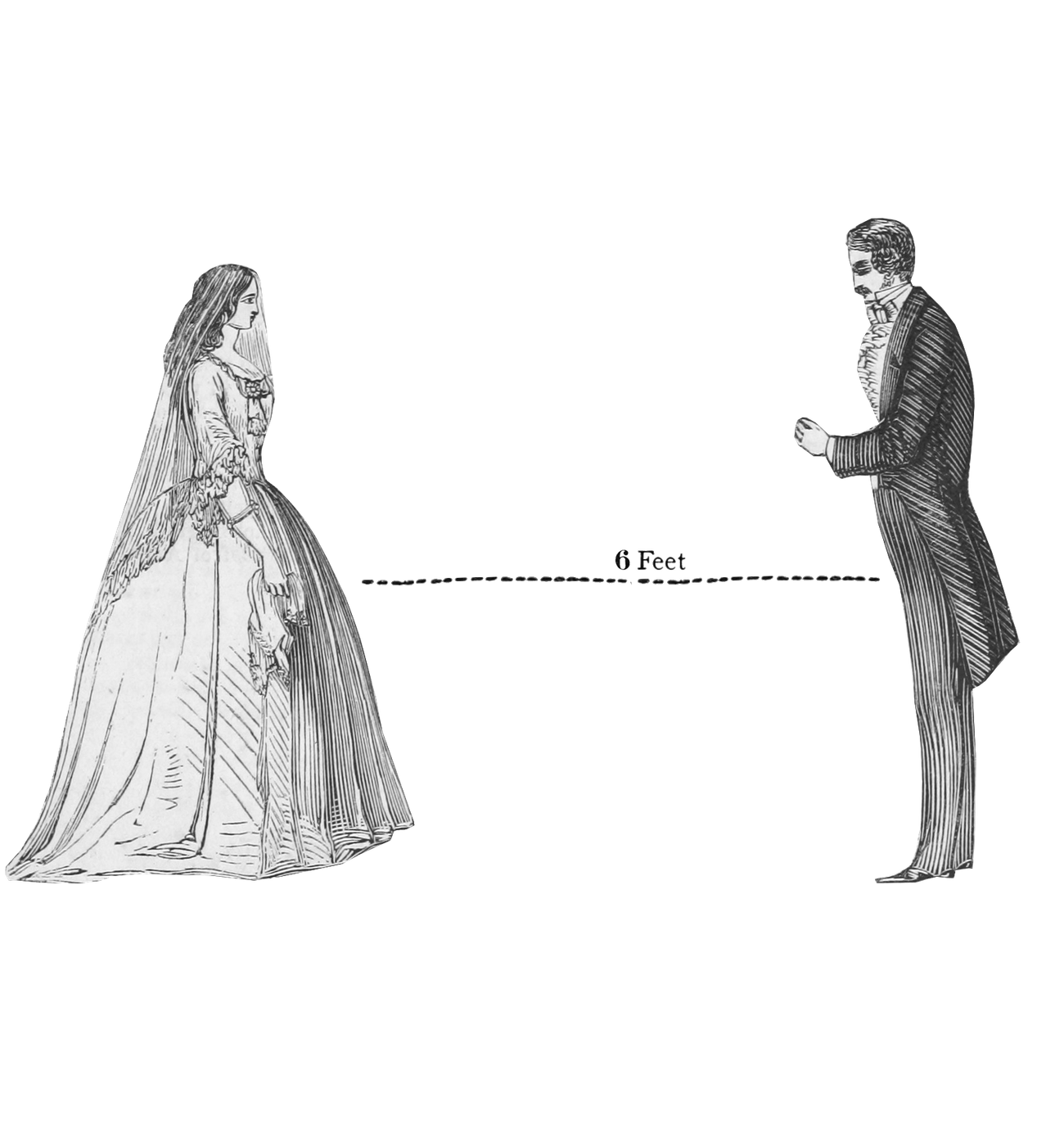Getting Married During a Pandemic
A wedding in a parking lot was not what we had planned




I felt the first harbinger of the doom and gloom that would go on to permeate all our lives these past few months on Monday, March 9, when I attended a Chabad Purim party. With Chabad, demonstrative, expansive joy normally marks even a simple grocery trip, let alone a celebration for the most joyous holiday of the year—but this Purim party was subdued. The rabbi walked around with a furrowed brow as a DJ halfheartedly blared Jewish music. I knew then that something was truly amiss.
That night, I anxiously Googled: Will my wedding be postponed because of coronavirus?
This led me down a rabbit hole of forums populated by terrified bridezillas worried about their $25,000 deposits and exotic destination weddings; my trepidation was not only warranted, it seemed, but I had arrived late to the panic party (and I’m never late to anything). My fiancé, who is right approximately 98.9% of the time, saw me sprawled on the couch in a state of immobilizing intensity and confidently told me to put my laptop away. Our long-awaited wedding, scheduled for March 25, he proclaimed, would undoubtedly squeak by.
Oh, you irksome 1.1%, how I loathe you.
By Wednesday, March 12, my children’s school went remote, then my job followed suit, and it became quite clear I would not have the wedding party I’d planned for and dreamed about for months. I wish I could say I dealt with it with grace and fortitude. Alas, I barely got out of bed on Thursday except to answer work emails, and suffered regular bouts of hysterical sobbing interspersed with pointed, passive-aggressive comments aimed at my poor fiancé. “The one time I actually wanted you to be right,” I hissed at him, “you were wrong.”
We’ve spent the past three years navigating a relationship filled with challenges we painstakingly endured with our eye on the ultimate prize: being married and under one roof, which we would celebrate with an epic wedding (or as epic as a limited budget could allow for). Now, this new challenge that I could never have foreseen in my wildest imagination—a global pandemic that would specifically prohibit public celebrations with your loved ones?—just about broke me.
That others would go on to suffer losses much worse than mine didn’t dawn on me or sink in during those first few days of despair. And when others pointed out with well-meaning but ill-conceived sentiments—At least you have … You should be grateful because … It could be worse …—that my loss was relatively negligible, I transferred them over to my mental burn book. These were probably the same people who comforted mourners at shiva homes or in other sorrowful situation with platitudes like: “She’s in a better place” or “God never gives you more than you can handle.” Of course I at least had my fiancé, my health, and a job. Of course I was grateful all our kids were healthy. Of course it could be worse. But in the moment, you cannot dispel or downplay a mourner’s grief, no matter the cause. Catharsis cannot be rushed.
I was tired of having to grit my teeth through yet another challenge and make the best of bleak realities. It was the day itself I longed for, as well as the auspicious tone I hoped it would set for a seamless transition into blended family life, which is complex enough in the simplest and most straightforward of situations. And my fiancé and I haven’t usually enjoyed the easiest circumstances. “Think of the story!” people trilled. But I had enough colorful stories; I wanted my wedding.
Initially, I was determined to wait until the pandemic was over to get married. “We waited three years,” I argued, “what’s another month or two?” But of course, each passing day brought a new article and a new, sobering realization about how our lives would radically change these next few months, and most likely, beyond. Who knew if it would even be this year? If the goal to be together under one roof was attainable, we should grab it. This also wasn’t my first nuptial rodeo—I knew well that the wedding was not the marriage. But oh, how I wanted that wedding.
After a couple more days of crying, debating, and ultimately, submission, I tried my best to both embrace and hastily arrange for a new austere version of marital sendoff: a rabbi’s office with just our kids, parents, and a few close friends present. Of course, within days even those compromises, already extreme in my view, had to be economized. My future in-laws were stuck in Florida. My own parents weren’t sure they felt comfortable coming. The ceremony couldn’t be inside anymore; we’d have to find an outdoor location. I crawled back into bed, cried some more, and then let my much more unflappable fiancé take over.
After all was said and cried, I did get married on the date in question. I wed my beloved in a municipal parking lot, which rendered even the Tiger King Joe Exotic himself, who at least got married to his two husbands indoors, classier than me. My fiancé not only scouted our outdoor slice of paved paradise but also built a chuppah out of wood beams and brought a big screen TV so our friends and families could watch via the magic of Zoom, though not all participants had learned the magic of the mute button. Our children and my sister were there, two of our close friends served as witnesses: One wore a hazmat suit, the other, Calvin Klein. A friend drove by with her kids, bearing colorful signs and an attractively frosted Duncan Hines wedding cake. My parents, in fancy outfits and their finest paper face masks, ended up driving in from Brooklyn but stayed safely in their car the entire time, looking longingly at my makeshift chuppah against the stunning backdrop of gravel and the town’s shuttered business district. Yes, I certainly had a story to tell.
The ceremony itself was brief but uniquely meaningful. Stripped of the usual elaborate fanfare that marks most modern Jewish weddings, it was a bare-bones version that featured only the halachic rituals. Our rabbi pulled double duty as mesader kedushin and chazzan, reciting all seven blessings, and he was also the one who recruited a minyan of men for this sacred mitzvah. (“It’s just like they did in Auschwitz,” my most sardonic friend and would-have-been photographer deadpanned when he learned about it.) Absent the usual pomp and circumstance, the ceremony was left only with its essential intention: to bind us together as husband and wife. And that itself was beautiful—though I only admitted it begrudgingly days later.
Of course, I still want the pomp, and I still want the circumstance. And I will have it, eventually, please God, if only because the wedding hall won’t return my deposit in full. “Can you imagine how epic this party will be?” encouraged my friend Jana. “People cannot wait to have a reason to party after all this!”
In the meantime, all of us must contend with an onslaught of terrible news, an oppressively restrictive lifestyle, and a national mood that can best be described as collectively grim. These weeks following Passover are its own period of Jewish mourning that mandate a host of halachic restrictions that hit eerily close to home. No weddings (hello!). No haircuts—my son’s bangs grew to his chin, like a prepubescent male version of Veronica Lake, before he allowed an untrained pair of hands wielding scissors to come near him. Certainly no one is listening to live instrumental music now, and who’s buying new clothes these days? You will literally be all dressed up with nowhere to go. As for the obsessive counting of days usually reserved for the most ardent of religious adherents, guess what? We’re all counting the Omer now.
But it’s the end of the Omer’s mourning period, Shavuot, that rings most thematically true for me these days. Essentially a marriage between God and the Jewish people, Shavuot is like a yearly vow renewal signifying that, like with any marriage, both partners must actively and deliberately choose each other over and over.
My husband and I have spent the past few weeks adjusting to the vagaries of a life marked by daily cohabitation that normally means only contending with adjusting to your beloved’s annoying quirks that you never previously noticed. (“Did you always chew so loudly?” “How can such a petite girl have such a heavy step?”) But we’re adjusting to these things as we simultaneously adjust to life amid a global pandemic. Life’s typical stressors—financial worries, parenting headaches, striking the right work-life balance—are all significantly amplified by the current situation. It’s not the best of times for anything right now, but it’s an especially imperfect time to start a new marriage.
I might not be blessed with the spirit of instant adaptability, but fortunately, my husband and I are equipped with years of experience meeting seemingly insurmountable challenges—challenges far greater than an improvised parking lot wedding. These next few months, our patience will undoubtedly wear thin. Our waistlines will likely thicken. Our pantry stock and bank accounts will fluctuate. But if we can make it through these next few months with the same love and determination that have propelled us this far safely intact, I’m almost certain that we can make it through anything.
In these anxious and unusual times, that’s something to truly celebrate—and I know a catering hall in New Jersey that owes us an epic party.
Tova Cohen is a fundraising communications professional and freelance writer. She lives with her family in New Jersey.